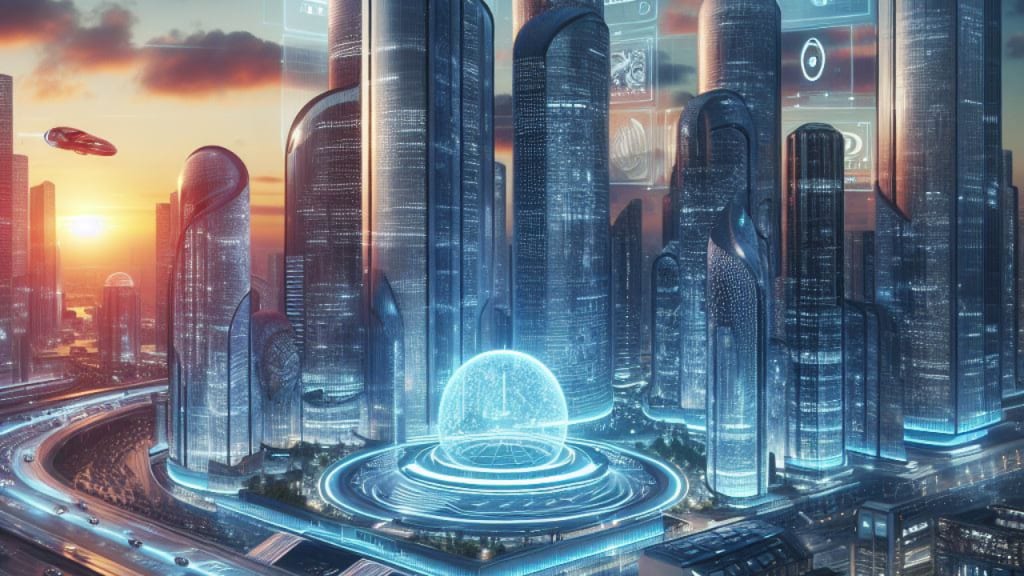The Future of Technology: What Lies Ahead in the Next Decade?
Unveiling the top tech trends shaping the next decade: AI, VR, robotics & more. Impact on healthcare, education & our future!

Technology is advancing at an exponential rate, constantly transforming the way we live, work, and interact with the world around us.
As we approach the next decade, an intriguing question arises: What does the future of technology hold?
In this article, we will explore the most prominent technological trends that are likely to shape the next decade.
We will address topics such as artificial intelligence, virtual and augmented reality, quantum computing, biotechnology, and robotics, among others.
We will also analyze the impact that these technologies could have on various sectors, such as healthcare, education, transportation, and the economy.
Artificial Intelligence (AI)
AI has become one of the most disruptive technologies of our time. Its ability to automate tasks, analyze data, and make intelligent decisions is revolutionizing a wide range of industries. In the next decade, we can expect:
- Ubiquitous AI: AI will be integrated into everyday life in a more profound way, from smart virtual assistants to smart homes that adapt to our needs.
- Advanced automation: AI will automate increasingly complex tasks, which could lead to changes in the labor market and the need for retraining for the workforce.
- Development of artificial general intelligence (AGI): Research will intensify to develop an AI capable of performing any intellectual task that a human can perform.
Virtual and Augmented Reality (VR/AR)
VR and AR are transforming the way we interact with the digital world. These technologies offer immersive and engaging experiences that have the potential to change the way we work, learn, and have fun. In the next decade, we can expect:
- Increased accessibility: VR and AR devices will become more accessible and affordable, which will drive their mass adoption.
- Integration with other technologies: VR and AR will be integrated with other technologies such as AI and 5G to create even more immersive and realistic experiences.
- Innovative applications: VR and AR will be used in various sectors, such as education, medicine, entertainment, and e-commerce.
Quantum Computing
Quantum computing has the potential to revolutionize computing as we know it. Quantum computers can perform complex calculations much faster than traditional computers. In the next decade, we can expect:
- Development of quantum hardware: Progress will be made in the development of more powerful and scalable quantum hardware.
- New quantum algorithms: New quantum algorithms will be developed to take full advantage of the capabilities of quantum computers.
- Applications in key areas: Quantum computing will be used to solve complex problems in areas such as chemistry, medicine, artificial intelligence, and cryptography.
Biotechnology
Biotechnology is transforming the way we understand and treat life. Advances in this area are enabling the development of new solutions for diseases, improving agriculture, and creating new materials. In the next decade, we can expect:
- Personalized medicine: Medicine will become increasingly personalized, with treatments tailored to the genetic and biological characteristics of each individual.
- New medical treatments: New treatments will be developed for diseases such as cancer, neurodegenerative diseases, and heart disease.
- Gene editing: Gene editing will be used to correct genetic diseases and improve human health.
Robotics
Robotics is playing an increasingly important role in the automation of tasks and assisting humans in various areas. In the next decade, we can expect:
- Smarter robots: Robots will become more intelligent and autonomous, capable of collaborating with humans safely and efficiently.
- New robots for industry: Robots will be developed to automate tasks in various industrial sectors, such as manufacturing, logistics, and agriculture.
- Robots for the home: Robots will be increasingly used in the home to perform tasks such as cleaning, cooking, and caring for the elderly.
Impact on Different Sectors
The technological trends mentioned above will have a significant impact on various sectors of the economy. Some examples include:
Healthcare: AI and robotics will be used to improve the accuracy of diagnoses, develop new treatments, and perform more precise surgeries. Biotechnology will enable the creation of new drugs and personalized therapies.
Education: VR and AR will be used to create immersive and engaging learning experiences. AI will be used to personalize education and provide support to students individually.
Transportation: Autonomous vehicles and 5G will revolutionize transportation, making it safer, more efficient, and more sustainable.
Economy: AI-driven automation will have a significant impact on the labor market. New jobs will be created, but others will be lost. It will be necessary to retrain the workforce to adapt to the new demands of the market.
Environment: Technology can be used to combat climate change and protect the environment. Renewable energy, smart agriculture, and waste management are some areas where technology can have a positive impact.
Challenges and Concerns
While the future of technology seems promising, there are also some challenges and concerns that need to be considered:
Inequality: Technology can exacerbate inequality between rich and poor, as those who have access to technology will be able to benefit more from it.
Privacy and security: The collection and use of personal data by technology companies is a major concern. It is necessary to ensure the privacy and security of user data.
Ethics: The development and application of technology should be guided by ethical principles. Clear ethical frameworks need to be established for the use of technology.
The future of technology is brimming with possibilities and challenges. The technological trends we have discussed have the potential to improve our lives in many ways, but they could also create new problems.
It is important that we prepare for the future of technology responsibly and ethically so that we can maximize its benefits and mitigate its risks.






Comments
There are no comments for this story
Be the first to respond and start the conversation.